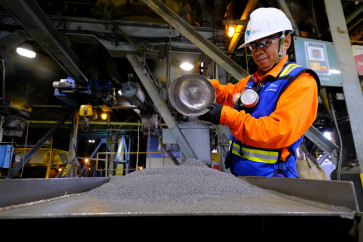Popular Reads
Top Results
Can't find what you're looking for?
View all search resultsPopular Reads
Top Results
Can't find what you're looking for?
View all search resultsPrabowo government inherits a troubled, extractive economy
Although roads and electricity networks have developed to meet the needs of the nickel companies, the government can make a much bigger commitment to reinvesting in schools, health services, clean water, sanitation systems and housing across the country’s nickel belt.
Change text size
Gift Premium Articles
to Anyone
 A worker monitors production on Aug. 2, 2024, at the nickel smelter of PT Vale Indonesia in Sorowako, South Sulawesi. Nickel is a key component in the batteries of electric vehicles, and Indonesia is both the world’s largest producer and home to the biggest known reserves globally. (AFP/Muchtamir Zaide)
A worker monitors production on Aug. 2, 2024, at the nickel smelter of PT Vale Indonesia in Sorowako, South Sulawesi. Nickel is a key component in the batteries of electric vehicles, and Indonesia is both the world’s largest producer and home to the biggest known reserves globally. (AFP/Muchtamir Zaide)
P
resident Prabowo Subianto inherits an economy that, compared with a decade ago, is more reliant upon extractive industries, consumes far more coal and is more dependent upon trade with China than ever before. These are major challenges for the incoming administration—and it will take immense political will to pursue reforms that can put Indonesia on the path to a more sustainable growth model.
One of outgoing President Joko “Jokowi” Widodo’s major legacy projects has been the rapid expansion of a nickel downstreaming industry, and Prabowo plans to stay the downstream course. Starting in 2020 with the raw nickel export ban, Jokowi forced foreign investors who wanted access to Indonesian nickel to pour their money into a nascent domestic smelting industry. Most of these investors were from China, which imports the vast majority of Indonesia’s nickel to feed its steel industry back home.
Officially, this policy has been touted as an economic success. Smelting has made a significant contribution to regional GDPs across the country’s nickel belt, provided new jobs for domestic workers and boosted export revenues. This story of growth, however, is complicated by a range of serious negative externalities that have now been documented extensively in both the local and international press.
At many of the nickel smelting parks there is irreversible environmental damage, and coal-fired power stations in these industrial parks are increasing Indonesia’s greenhouse gas emissions. Indeed, Jokowi over saw a massive increase in domestic coal consumption, more than doubling since 2014 and with a particularly large spike between 2021 and 2022 when many smelters came online.
The sector’s distributional benefits are limited. Local people living around nickel mines and smelters have experienced minimal income growth, and in some cases, inequality and poverty rates have increased in nickel mining districts. Most of the more skilled industrial jobs are held by international or internal domestic migrants, while the local population predominantly works in unskilled labor or in the provision of informal services. And due to environmental degradation, many local residents who relied on agricultural and fishing-based occupations are finding it increasingly difficult to eke out a living.
Human development and ecological sustainability seem to have fallen by the wayside. In short, the industry’s fast-paced expansion sacrificed a long-term vision for sustainable growth. But Indonesia’s leadership has, over time, come to understand the extent to which these social and environmental externalities can become economic challenges — for example, poor environmental, social and governance (ESG) standards and excessive Chinese ownership now block Indonesia from accessing United States markets.
There are ways Prabowo’s new government can reform the sector and make sustainable development more of a central focus. Indeed, a shift toward sustainability is necessary to align with Prabowo’s Asta Cita, harmonizing Vision 5 (the continuation of downstreaming) and Vision 6 (village economic development).


















